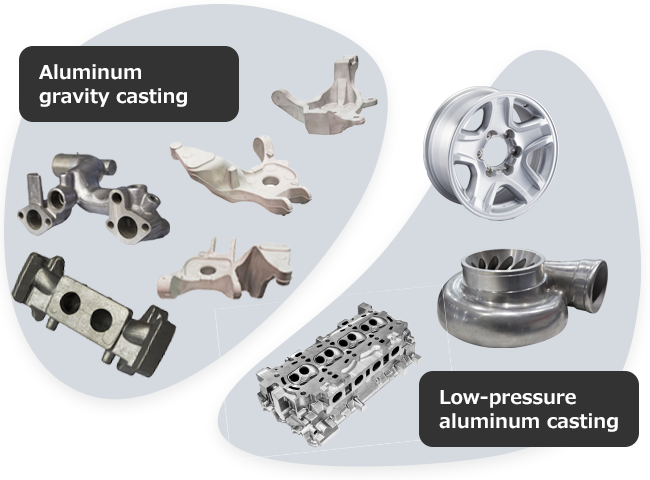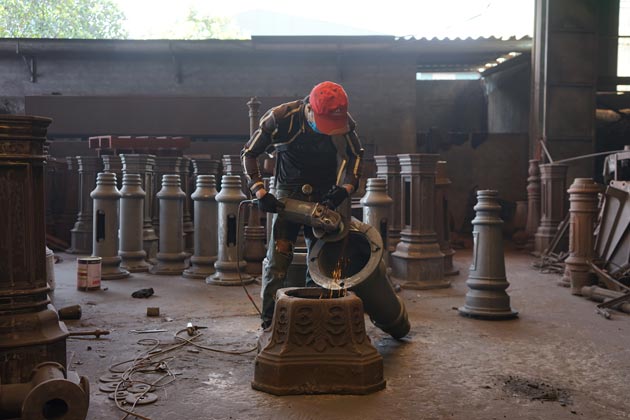Understanding the Advantages and Innovations in the Aluminum Foundry Sector
The Aluminum Foundry market plays an essential function in contemporary manufacturing. Its lightweight properties significantly boost gas effectiveness, specifically in vehicle and aerospace industries. Additionally, Aluminum's resistance to corrosion guarantees longevity in different applications. As the industry progresses, technologies such as sophisticated recycling and additive production are improving manufacturing techniques. Checking out these innovations exposes not only the advantages however additionally the obstacles in advance for Aluminum foundries in a quickly altering market.
The Lightweight Advantage of Aluminum
Aluminum's lightweight nature offers substantial advantages throughout different industries, specifically in manufacturing and transport. Its reduced density permits the manufacturing of parts that are easier to manage and install, causing decreased labor costs and improved performance. In the automobile industry, lighter automobiles add to enhanced gas economic climate and reduced discharges, aligning with worldwide sustainability goals. In aerospace, the usage of Aluminum lowers the general weight of airplane, which is important for enhancing performance and decreasing functional costs.
In addition, Aluminum's light-weight buildings assist in innovative designs that were formerly unfeasible with much heavier materials. This versatility enables producers to produce complicated shapes and frameworks while preserving architectural honesty. In general, the lightweight benefit of Aluminum not just enhances product performance however likewise drives advancements in innovation and style, making it a favored product in various applications.
Rust Resistance and Toughness
The Aluminum Foundry industry is renowned for creating materials with remarkable deterioration resistance, making them suitable for numerous applications. This home, combined with boosted structural honesty, adds to the resilient efficiency advantages that Aluminum components supply. Therefore, industries significantly count on Aluminum to meet requiring ecological conditions without endangering high quality.
Superior Corrosion Resistance
While various metals encounter considerable challenges from ecological elements, Aluminum stands apart for its remarkable corrosion resistance, making it a recommended option in lots of applications. This property is largely as a result of an all-natural oxide layer that develops on the Aluminum surface area, giving a barrier versus wetness and harsh agents. Unlike other steels that might corrosion or weaken with time, Aluminum keeps its honesty even in rough environments, such as commercial setups or seaside locations. Additionally, its lightweight nature integrated with rust resistance makes it perfect for applications in aerospace, automotive, and aquatic markets. Overall, Aluminum's extraordinary toughness not only improves product longevity however also lowers upkeep prices, providing an engaging benefit for consumers and makers alike.
Boosted Structural Honesty
Designers and designers progressively identify the value of boosted structural honesty in modern-day applications, where both deterioration resistance and longevity are crucial. Aluminum alloys, known for their lightweight residential or commercial properties, also exhibit remarkable resistance to corrosion, making them ideal for extreme atmospheres. The cutting-edge strategies utilized in the Aluminum Foundry market contribute significantly to generating components with improved toughness. Advanced casting processes and alloy structures are tailored to fulfill particular performance demands, making sure that frameworks can withstand severe conditions without endangering stability. Surface area therapies and coatings enhance the lifespan of Aluminum items, even more reducing deterioration over time. This concentrate on improved structural integrity not only expands the usability of materials yet additionally reduces upkeep costs, solidifying Aluminum's position as a material of option in various markets.
Lasting Performance Conveniences
Lasting efficiency in Aluminum parts is largely connected to their remarkable corrosion resistance and resilience. Unlike many metals, Aluminum naturally forms a safety oxide layer, which prevents rust and wear and tear in different environments, including marine and industrial setups. This inherent residential or commercial property considerably expands the life expectancy of Aluminum products, minimizing maintenance and substitute expenses. On top of that, the lightweight nature of Aluminum improves its applicability across industries without compromising strength. The product's resistance to use and tear likewise adds to its dependability popular applications, making it an optimal selection for automobile, aerospace, and building and construction markets. As industries significantly prioritize sustainability and durability, Aluminum's efficiency benefits straighten with contemporary design requirements, solidifying its function in ingenious manufacturing processes.
Environmental Influence and Sustainability
 As the Aluminum Foundry sector progresses, it progressively prioritizes ecological effect and sustainability, identifying the demand for accountable methods in the face of climate change. Efforts to decrease waste and energy consumption go to the leading edge, with many foundries embracing reusing initiatives to redeem Aluminum scrap. This not just minimizes basic material use however additionally especially reduces energy expense, as recycled Aluminum needs just a fraction of the energy contrasted to primary production.
As the Aluminum Foundry sector progresses, it progressively prioritizes ecological effect and sustainability, identifying the demand for accountable methods in the face of climate change. Efforts to decrease waste and energy consumption go to the leading edge, with many foundries embracing reusing initiatives to redeem Aluminum scrap. This not just minimizes basic material use however additionally especially reduces energy expense, as recycled Aluminum needs just a fraction of the energy contrasted to primary production.Additionally, advancements in discharges control modern technologies are being applied to decrease air toxins, aligning click this operations with stricter ecological guidelines. Shops are likewise checking out alternative energy sources, such as solar and wind, to power their centers sustainably. By promoting partnership with stakeholders, the industry aims to develop cutting-edge remedies that boost environmental stewardship. Collectively, these initiatives highlight a commitment to lowering the Aluminum Foundry's carbon impact while advertising a circular economy within the manufacturing market.
Advanced Manufacturing Techniques
 Changing manufacturing procedures, the Aluminum Foundry sector is increasingly incorporating sophisticated manufacturing techniques to enhance efficiency and precision. Methods such as computer system numerical control (CNC) machining and additive manufacturing have actually become crucial parts in enhancing production process. CNC machining enables high-precision element fabrication, substantially minimizing product waste and production time. At the same time, additive manufacturing opens up brand-new methods for intricate geometries and lightweight styles that were formerly difficult to attain.
Changing manufacturing procedures, the Aluminum Foundry sector is increasingly incorporating sophisticated manufacturing techniques to enhance efficiency and precision. Methods such as computer system numerical control (CNC) machining and additive manufacturing have actually become crucial parts in enhancing production process. CNC machining enables high-precision element fabrication, substantially minimizing product waste and production time. At the same time, additive manufacturing opens up brand-new methods for intricate geometries and lightweight styles that were formerly difficult to attain.Furthermore, the deployment of automation and robotics in Aluminum factories simplifies procedures, decreases human mistake, and improves worker safety and security. These modern technologies facilitate a more responsive manufacturing setting, enabling makers to adjust rapidly to market needs. The assimilation of advanced simulation software additionally boosts the design and testing phases, resulting in exceptional item top quality. Jointly, these methods not just boost operational efficiency but additionally foster technology, placing the Aluminum Foundry sector at the center of modern manufacturing.
Advancements in Recycling Procedures
The Aluminum Foundry sector is not just advancing in producing techniques but is you can try this out also making substantial strides in reusing procedures. Developments are emerging to boost the effectiveness of recycling methods, reducing power consumption and enhancing sustainability. Advanced sorting technologies, such as automated optical sorting, make it possible for the identification and separation of Aluminum from various other products with high precision. This results in a greater top quality of recycled Aluminum, which is essential for maintaining the stability of the end products.
In addition, closed-loop recycling systems are being implemented, allowing producers to recycle Aluminum scrap within their own manufacturing procedures. This lessens waste and promotes a round economy. Furthermore, research study right into new recycling strategies, such as hydrometallurgical procedures, uses the potential for recouping Aluminum from complex waste streams. These developments not just contribute to decreasing the carbon impact of the Aluminum Foundry sector however likewise bolster its financial viability in a progressively ecologically aware market.
Applications Across Numerous Industries
Numerous industries are increasingly acknowledging the versatility and pop over to these guys benefits of Aluminum Foundry products, resulting in extensive applications across markets such as automotive, customer, building, and aerospace products. In the vehicle industry, Aluminum castings add to light-weight car designs, boosting fuel efficiency and performance. Aerospace manufacturers use Aluminum elements for their strength-to-weight proportion, important for airplane frameworks and components.
In construction, Aluminum is preferred for its durability and resistance to rust, making it optimal for home window frameworks, roofing, and structural supports. Customer goods additionally gain from Aluminum Foundry items, as seen in cookware, electronic devices, and product packaging, where lightweight and recyclable products are vital.
The adaptability of Aluminum Foundry methods enables accurate specifications and complex layouts, accommodating the varied requirements of these sectors. Because of this, Aluminum Foundry items are becoming important to contemporary manufacturing procedures across different fields.
Future Patterns in Aluminum Foundries
As sectors remain to progress, Aluminum shops are positioned to welcome a number of vital fads that guarantee to enhance efficiency and sustainability. One prominent pattern is the raising adoption of digital modern technologies, consisting of automation and fabricated intelligence, which streamline operations and boost quality assurance. Additionally, the push in the direction of lasting techniques is leading shops to invest in reusing modern technologies, greatly lowering waste and energy intake.
 One more arising fad is the use of innovative alloys and materials, catering to the expanding demand for long lasting and lightweight components across various markets (Aluminum Foundry). The assimilation of additive production techniques is expected to change part layout, offering modification and lowering lead times.
One more arising fad is the use of innovative alloys and materials, catering to the expanding demand for long lasting and lightweight components across various markets (Aluminum Foundry). The assimilation of additive production techniques is expected to change part layout, offering modification and lowering lead times.Collaboration with research organizations is additionally anticipated to drive innovation, as foundries look for to develop new processes and materials. Aluminum Foundry. Collectively, these fads indicate a transformative future for the Aluminum Foundry sector, straightening with more comprehensive objectives of sustainability and performance
Regularly Asked Questions
What Are the Typical Costs Connected With Aluminum Foundry Manufacturing?
The regular costs connected with Aluminum Foundry manufacturing include basic materials, labor, energy, equipment maintenance, and overhead expenses. These elements collectively influence the overall financial investment required for effective Aluminum spreading procedures.
Exactly How Does Aluminum Contrast to Various Other Steels in Stamina?
Aluminum, while lighter than lots of metals, exhibits excellent strength-to-weight ratios. Compared to steel, Aluminum is much less strong however provides outstanding corrosion resistance, making it a beneficial option in applications where weight and durability are essential.
What Precaution Remain In Place in Aluminum Foundries?
Safety measures in Aluminum shops normally include required individual protective tools, air flow systems to control fumes, routine equipment upkeep, training programs for workers, and adherence to strict security policies to decrease dangers associated with liquified steel handling.
Just How Is Quality Control Managed in Aluminum Spreading Processes?
Quality control in Aluminum spreading processes entails extensive inspections at different stages, including raw material examination, process surveillance, and final item testing. Methods such as analytical process control and non-destructive screening guarantee adherence to industry requirements.
What Qualifications Are Crucial for Aluminum Foundry Suppliers?
The importance of certifications for Aluminum Foundry vendors consists of ISO 9001 for high quality monitoring, ISO 14001 for environmental monitoring, and industry-specific requirements like ASTM and SAE, making certain compliance, security, and dependability in manufacturing procedures.
The Aluminum Foundry sector plays a necessary role in contemporary production. The Aluminum Foundry industry is renowned for creating products with remarkable deterioration resistance, making them ideal for different applications. Changing manufacturing procedures, the Aluminum Foundry sector is progressively incorporating innovative production strategies to improve efficiency and precision. The Aluminum Foundry industry is not only advancing in making techniques but is likewise making considerable strides in recycling procedures. As industries continue to evolve, Aluminum foundries are poised to welcome several key trends that promise to enhance performance and sustainability.